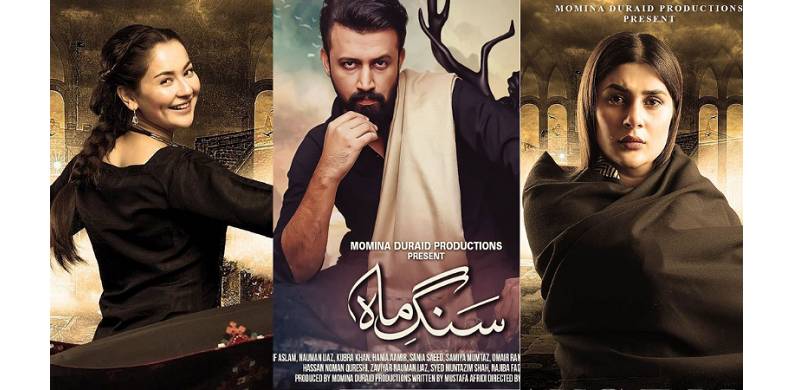
Here’s a script rooted in indigenous feminism: the supremely talented Samiya Mumtaz, portraying Zarsanga, takes back her agency when she is forced to marry against her will. Yes, murder is not justifiable, but neither is persuading women to marry on the basis of power. Instead of succumbing to Stockholm Syndrome and falling in love with her abuser, she fights back and refuses to be treated like an object. Kudos to showing women as living, breathing, thinking rational creatures rather than playing hapless victims to their circumstances.
Here’s a show that leaves a lasting impact on you. You pause and reflect on what’s being said rather than rolling your eyes at the cringe on display. The clan of ‘Ghag’ victims led by Sania Saeed invade the most predominantly male space, the jirga, and demand to be given justice head-on. There’s no room to wallow and berate your kismet (fate). You have every right to be treated fairly by virtue of being born on this soil. Not only is the justice demanded with full conviction, these women also ensure that future victims don’t have to go through what any of them did. How beautiful it is to see women fighting at the grassroots level to demand empowerment of their community, and not be swayed by personal gains at the cost of other women!
It has been a while since one has seen characters as evolved as Haji Marjaan and Zarsanga on television. There are no petty egos or personal grudges, but an equation of utmost respect and unadulterated admiration for each other. Kudos to Mustafa Zaidi for giving his lead couple (if I may say so) such a solid foundation. There are next to no references in contemporary Pakistani culture that show such aspirational content.
Now to the new acting prowess in the industry who’s here to stay and conquer our screens, Atif Aslam remains remarkable as ever. The range of emotions he has shown in his debut performance is perhaps as wide as his astounding singing range. From highs to lows, revenge to regret, despair to dearth, his performance remains spot on with a unique old-school charm that’s hard to imitate.
Heartiest congratulations to the entire team for being a part of something as monumental and engaging as this. Here’s to hoping the finale of this trilogy supersedes its predecessors.
Here’s a show that leaves a lasting impact on you. You pause and reflect on what’s being said rather than rolling your eyes at the cringe on display. The clan of ‘Ghag’ victims led by Sania Saeed invade the most predominantly male space, the jirga, and demand to be given justice head-on. There’s no room to wallow and berate your kismet (fate). You have every right to be treated fairly by virtue of being born on this soil. Not only is the justice demanded with full conviction, these women also ensure that future victims don’t have to go through what any of them did. How beautiful it is to see women fighting at the grassroots level to demand empowerment of their community, and not be swayed by personal gains at the cost of other women!
It has been a while since one has seen characters as evolved as Haji Marjaan and Zarsanga on television. There are no petty egos or personal grudges, but an equation of utmost respect and unadulterated admiration for each other. Kudos to Mustafa Zaidi for giving his lead couple (if I may say so) such a solid foundation. There are next to no references in contemporary Pakistani culture that show such aspirational content.
Now to the new acting prowess in the industry who’s here to stay and conquer our screens, Atif Aslam remains remarkable as ever. The range of emotions he has shown in his debut performance is perhaps as wide as his astounding singing range. From highs to lows, revenge to regret, despair to dearth, his performance remains spot on with a unique old-school charm that’s hard to imitate.
Heartiest congratulations to the entire team for being a part of something as monumental and engaging as this. Here’s to hoping the finale of this trilogy supersedes its predecessors.

